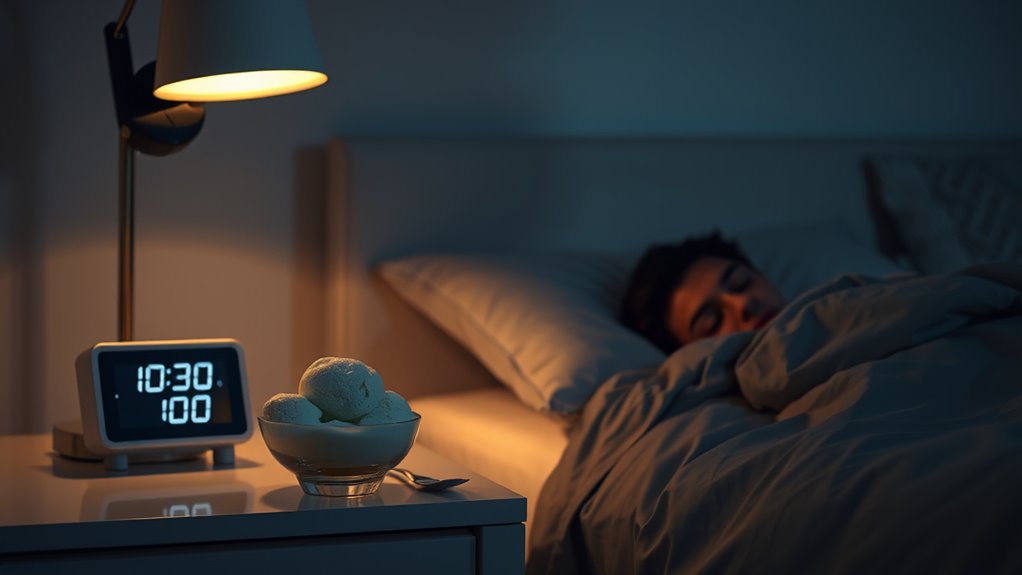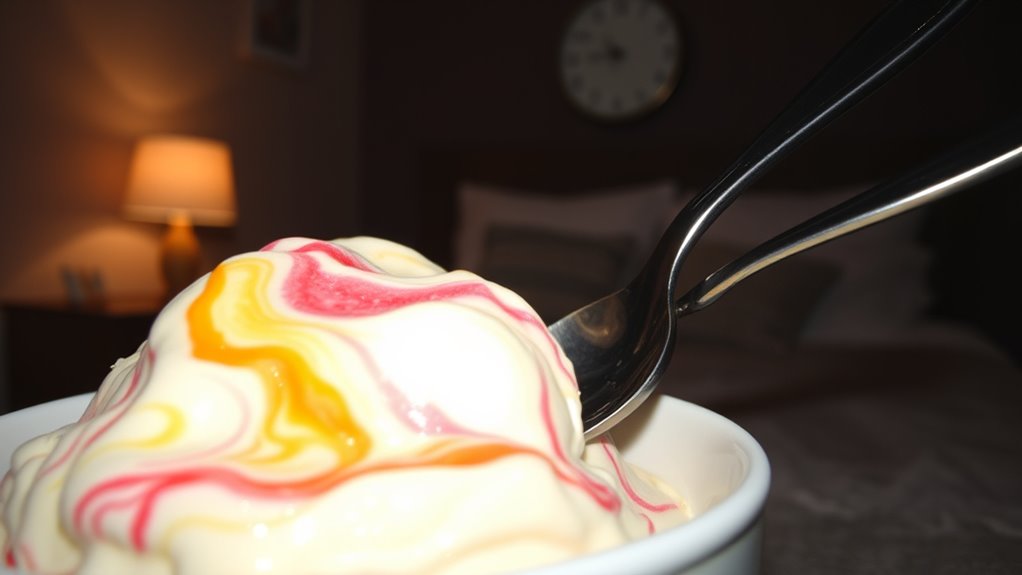Eating ice cream before bed can hurt your sleep quality due to its high sugar content. The sugar causes blood sugar spikes followed by crashes, leading to sleep disturbances. Additionally, ice cream can cause digestive discomfort and bloating at night. You might find it tougher to manage weight and insulin sensitivity if you snack late. Opting for lighter alternatives could improve your sleep. There’s more to learn about how your choices can affect your rest.
Key Takeaways
- Eating ice cream before bed can cause blood sugar spikes, leading to poor sleep quality and increased likelihood of disturbances.
- High sugar content in ice cream can disrupt hormonal balances, affecting cortisol levels and deep sleep patterns.
- Late-night consumption of ice cream may result in digestive discomfort, such as bloating and acid reflux, hindering restful sleep.
- The high calorie content of ice cream can contribute to weight gain, which is associated with increased risk of sleep disorders.
- Healthier dessert alternatives, like yogurt or fruit-based options, can promote better sleep without the negative effects of ice cream.
The Impact of Sugar on Sleep Quality

When you consume sugar, it can considerably disrupt your sleep quality. High sugar intake causes fluctuations in your blood sugar levels, leading to restless nights. You might experience rapid energy spikes followed by crashes, making it tough to maintain consistent sleep. Studies show that people who eat more added sugars report poorer sleep quality, with some even being 3.5 times more likely to suffer from sleep disturbances. Additionally, sugar can alter hormonal balances, affecting cortisol levels and disrupting deep sleep patterns. If you indulge in sugary snacks close to bedtime, the high sugar content can intensify these effects. To improve your sleep, consider cutting back on sugar and avoiding high-sugar foods in the evening to help you achieve a more restful night. Maintaining hydration benefits during the day can also support better sleep quality at night. Furthermore, consuming natural remedies like herbal teas can promote relaxation and help you wind down before bedtime. Incorporating mindfulness practices before bed may further enhance your ability to fall asleep and stay asleep. On top of that, enhancing your diet with foods rich in antioxidants can contribute to overall well-being, potentially improving sleep quality.
Dairy’s Role in Disrupted Sleep Patterns

Although dairy products are often praised for their health benefits, their role in sleep patterns can be quite complex. Dairy contains tryptophan, an amino acid that converts to serotonin and melatonin, potentially helping you sleep better. However, the effects can vary based on the type of dairy you consume. For instance, milk and fermented products like yogurt might promote better sleep due to their unique compounds, such as GABA, which can enhance relaxation. While some studies link dairy intake to improved sleep quality, results are mixed, and more research is necessary. It’s essential to evaluate the timing and type of dairy consumed, as high-fat options may disrupt your sleep rather than support it. Additionally, certain dairy products like ice cream may contain high sugar levels, which can lead to blood sugar spikes and disrupt your sleep. Moreover, consuming high-sugar foods can increase respiratory issues, which may negatively affect sleep quality.
How Ice Cream Affects Digestion

Ice cream, while a delightful treat, can considerably impact your digestion, especially if you indulge before bedtime. Its high-fat content slows down digestion, as fats and proteins take longer to break down in your stomach. Because ice cream doesn’t require chewing, it bypasses the initial breakdown process, leading to potential discomfort. Consuming it late at night can cause bloating, gas, and even acid reflux due to the dairy and sugar content. If you’re lactose intolerant, you might experience even more digestive issues. The extra strain on your digestive system at night can disrupt both your digestion and your sleep. Additionally, high sugar content in ice cream can ferment in the gut, leading to further discomfort. To avoid these problems, consider enjoying ice cream earlier in the day or opting for lighter alternatives. Eating ice cream in moderation can help prevent health issues related to excessive sugar and fat intake. Furthermore, regular consumption of high-fat foods like ice cream can increase heart disease risk, making it important to be mindful of your choices. Furthermore, consuming high-sugar foods like ice cream can lead to increased energy levels before bed, making it harder to fall asleep.
Blood Sugar Fluctuations and Sleep Disruption

Blood sugar fluctuations can considerably disrupt your sleep, especially if you consume high-sugar foods like ice cream before bed. When you indulge in ice cream, your blood sugar spikes, followed by a crash that can interrupt your sleep cycles. This effect is more pronounced if you struggle with insulin resistance, making it harder for your body to manage glucose levels during the night. Additionally, the natural surge in blood sugar due to your circadian rhythm can exacerbate these fluctuations. Healthy individuals maintain stable blood sugar levels due to insulin effectiveness, which can be compromised by poor sleep. Furthermore, essential oils can help promote relaxation and potentially improve your sleep quality. Moreover, poor sleep can impact Required Minimum Distributions (RMDs) if you are relying on retirement savings for financial stability. Poor sleep from these spikes can lead to reduced insulin sensitivity, creating a vicious cycle that impacts your overall health. To improve your overall health, it’s essential to maintain stable blood sugar levels throughout the day. Consuming high-sugar foods like ice cream before bed can lead to increased heart disease risk due to their impact on your overall dietary balance. To avoid these disruptions, consider healthier nighttime snacks that won’t elevate your blood sugar levels.
Weight Management Concerns With Late-Night Ice Cream

When you reach for ice cream late at night, you mightn’t realize the impact it can have on your weight management efforts. Ice cream’s high calorie content can considerably increase your daily intake, leading to weight gain if consumed regularly before bed. As your metabolism slows down at night, those extra calories are more likely to be stored as fat. Plus, ice cream lacks essential nutrients and fiber, which can create nutritional imbalances in your diet. Although some fad diets allow for ice cream, they often rely on overall calorie restriction, not the ice cream itself. Ultimately, indulging in late-night ice cream can disrupt your weight management goals and contribute to unhealthy eating patterns. Caloric restriction is key to successful weight loss, making nighttime indulgences particularly risky. Moreover, metabolism slowing down during sleep can exacerbate the effects of high-calorie snacks like ice cream. Incorporating whole foods into your diet can help offset cravings and promote better nutritional balance. Additionally, following a low carb diet can help manage cravings better and support your overall weight loss efforts. Instead of ice cream, consider keto-friendly alternatives that satisfy your sweet tooth without compromising your diet.
Healthier Alternatives to Ice Cream Before Bed

Late-night cravings for something sweet can be tempting, especially after a long day. Instead of reaching for traditional ice cream, consider healthier alternatives that satisfy your sweet tooth without compromising your well-being.
Late-night sweet cravings? Opt for healthier alternatives to traditional ice cream that delight your taste buds and support your well-being.
Brands like Halo Top and Enlightened offer low-calorie ice creams sweetened with natural ingredients. If you prefer homemade options, try avocado nice cream or banana nice cream for a creamy, guilt-free treat. Healthier options reduce calories and fat content, making them ideal for late-night snacking. Incorporating nutrient-rich ingredients can also enhance the health benefits of your dessert. For instance, adding fresh fruits like bananas or berries can boost the nutritional value of your nice cream. Additionally, choosing desserts with low sugar content can further support your sleep quality. Including chia seeds in your recipes can provide additional fiber and omega-3 fatty acids, promoting overall health.
Yogurt parfait popsicles and fruit-and-yogurt cones are also great ways to enjoy a revitalizing dessert. For a sleep-friendly snack, consider tart cherry smoothies or apple slices with peanut butter, both of which can help promote better sleep.
These alternatives let you indulge without the added calories and sugar.
Long-Term Health Implications of Nighttime Snacking

While indulging in nighttime snacks might seem harmless, over time, it can lead to significant health issues. Regularly consuming high-calorie foods at night increases your risk of obesity and related metabolic disorders. Late-night eating can also hinder your body’s ability to metabolize calories effectively, further compounding these risks. Additionally, proper hydration is crucial for maintaining metabolic health, which can be disrupted by late-night snacking.
You might also face a higher chance of developing cardiometabolic diseases, like diabetes, due to disrupted insulin sensitivity. Moreover, late-night eating can exacerbate gastrointestinal issues, such as acid reflux, making you uncomfortable.
Research even suggests a potential link between late-night snacking and an increased cancer risk, particularly for breast and prostate cancers. Additionally, relying on high-calorie, low-nutrient foods could create dietary imbalances, negatively impacting your overall health.
It’s essential to take into account these long-term implications when reaching for that late-night treat.
Tips for Better Sleep Hygiene

Nighttime snacking can disrupt your sleep quality and overall health, making it essential to establish good sleep hygiene.
Start by maintaining a consistent sleep schedule; go to bed and wake up at the same time daily, even on weekends. Aim for 7 to 9 hours of sleep each night.
Create a comfortable bedroom environment—reduce light and noise, and keep the temperature cool. Avoid stimulants like caffeine and nicotine close to bedtime, and steer clear of heavy meals. Instead, opt for light snacks if needed, as eating close to bedtime can disrupt digestion and sleep.
Engage in relaxing activities, like reading or meditation, before bed. Monitor your sleep patterns using a diary to identify areas for improvement, ensuring you make necessary adjustments for better rest.
Frequently Asked Questions
Can Ice Cream Cravings Indicate an Underlying Nutritional Deficiency?
Craving ice cream doesn’t usually point to a specific nutritional deficiency; it’s often driven by emotional factors or habits.
While it provides calcium, the high sugar and fat content makes it a poor choice for regular consumption.
If you’re frequently craving ice cream, consider healthier options like frozen yogurt or fruit. These can satisfy your sweet tooth while helping you meet your dietary needs without excessive calories.
What Time Should I Stop Eating Ice Cream at Night?
Imagine indulging in a late-night scoop of ice cream, reminiscent of childhood joy.
However, to avoid potential issues, you should stop eating ice cream at least three hours before bed. This timeframe allows your body to digest properly, reducing the risk of discomfort and sleeplessness.
If you’re prone to heartburn or lactose intolerance, consider cutting back even earlier. Opting for lighter snacks can create a smoother shift to a restful night.
Are There Specific Ice Cream Flavors Worse for Sleep?
Certain ice cream flavors can definitely impact your sleep.
For instance, chocolate ice cream contains caffeine and theobromine, which can keep you alert and make it harder to fall asleep. Additionally, high sugar content in most flavors can lead to blood sugar spikes, disrupting your rest.
If you’re looking for better sleep, consider avoiding chocolate and opting for lighter, sleep-friendly alternatives like vanilla or specially formulated night-time ice cream.
Does the Temperature of Ice Cream Impact Sleep Quality?
Isn’t it ironic how something so cold can heat up your sleep struggles?
While the temperature of ice cream mightn’t directly impact your sleep quality, the ingredients certainly do. Cold treats won’t greatly alter your body temperature, but high sugar and dairy can keep you tossing and turning.
Instead of indulging late at night, consider enjoying ice cream earlier or choosing sleep-friendly alternatives to guarantee a restful night’s sleep.
Can Occasional Ice Cream Consumption Before Bed Be Harmless?
Occasional ice cream consumption before bed can be harmless for most people.
If you enjoy a small scoop now and then, it likely won’t disrupt your sleep greatly.
However, be mindful of portion sizes and timing. Eating too much or too close to bedtime can lead to discomfort or digestive issues.
Opting for lighter options or allowing a few hours for digestion can help you indulge without the negative effects.
Conclusion
To sum up, indulging in ice cream before bed might seem tempting, but it can lead to disrupted sleep and digestive issues. Imagine this: after a late-night scoop, you toss and turn, your body battling sugar spikes while you try to drift off. Instead of reaching for that bowl, consider a calming herbal tea or a piece of fruit. By making smarter choices, you can enjoy a restful night and wake up refreshed, ready to seize the day.









